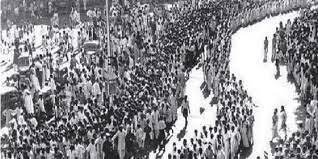The Quit India Movement was a political campaign launched in India in 1942, calling for an end to British rule and the withdrawal of British forces from the country. The movement was a response to the growing discontent among the Indian masses against the British government, and was inspired by the call for independence by the Indian National Congress.

The key causes of the Quit India Movement
- Failure of Negotiations: The Indian National Congress had been negotiating with the British government for greater political rights and independence, but these talks had failed to produce any meaningful results.
- World War II: The British government was heavily engaged in World War II and was unable to address the demands of the Indian independence movement.
- Growing Discontent: The Indian masses were growing increasingly frustrated with the economic hardship and political oppression caused by British rule.
The Quit India Movement was marked by several key events, including:
- Congress Resolution: On August 8, 1942, the Indian National Congress passed a resolution calling for an end to British rule and the withdrawal of British forces from India.
- Gandhi’s speech: Gandhi gave a powerful speech at the Gowalia Tank Maidan in Mumbai, calling for mass civil disobedience and nonviolent resistance.
- Mass arrests: The British government arrested all the top leaders of the Indian National Congress, including Gandhi, and declared the movement to be illegal.
The key leaders of the Quit India Movement were:
- Mahatma Gandhi: He was the principal leader of the movement and his call for nonviolent resistance inspired millions of Indians to join the struggle for freedom.
- Jawaharlal Nehru: He was a prominent leader of the Indian National Congress and played a crucial role in organizing the movement.
- Sardar Vallabhbhai Patel: He was one of the leaders of the Indian independence movement and played a key role in the Quit India Movement.
The Quit India Movement had a profound impact on the Indian freedom struggle. It demonstrated the determination of the Indian people to achieve independence and their willingness to engage in mass civil disobedience and nonviolent resistance. The movement also forced the British government to reconsider its position on Indian independence, and helped to build international support for the independence cause. The movement ultimately contributed to the eventual independence of India in 1947.